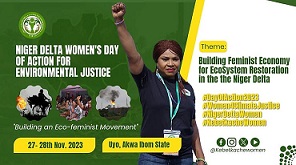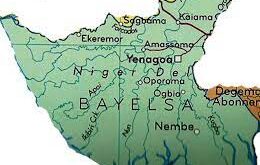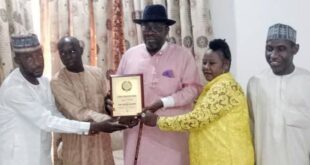Of the 27.1 million people in the Niger Delta region, over 70% live at subsistence level, with a greater percentage of them being women. A situation made even worse by the extractive activities of international oil companies, which had degraded their environment, denied the people access to their farmlands and livelihood, clean drinking water anong others.
This, according to the media officer of Kebetkache Women Development & Resource Centre, Nsemeke Fabian, informed the organization and her allied community women organizations coming together to mark the ‘Niger Delta Women’s Day of Action for Environmental Justice.’
According to a release made available by Nsemeke, the Women’s Day of Action for Environmental Justice, which will hold from November 27 to 28, 2023, with the theme: ‘Building a Feminist Economy for Ecosystem Restoration in the Niger Delta,’ “contributes to the building of a grassroots eco-feminist movement in the Niger Delta.
“It strengthens women resilience and builds the leadership capacity of women to lead local advocacy actions for eco-friendly extractive practices,” he said, adding that “the Day of action has promoted visibility of community women initiatives to campaign for climate justice and hold government accountable for the degradation of the environment in the Niger Delta.
“The United Nations Framework Convention on Climate Change (UNFCCC, 2021) agrees that women commonly face higher risks and greater burdens from the impacts of climate change. They are suffering direct impacts of climate crisis. In Niger Delta, women face inequalities, human rights violations, exclusion from decision making and governance processes, poverty, lack of property ownership, poor living conditions, vulnerability to violence, lack of quality education, and poor health facilities.
“The Niger Delta became the boom camp of international oil companies (IOCs) for oil and gas activities by virtue of the Petroleum Act of 1969. Without any consultation with the people who live in the Niger Delta, the Federal Government of Nigeria mandated the IOCs to explore and exploit the vast terrain of the Niger Delta for hydrocarbon deposits for the benefit of the IOCs and all the people of Nigeria, an act of “generosity” that discounted the disposition of the real owners of the hydrocarbon deposits, the subject of ownership having been redefined by the provisions of the Petroleum Act.”
The release pointed out that of the 30% habitable land in the Niger Delta, less than 50% of land available for agriculture has been put to use while the remaining has been degraded by the oil industry.
“44.2% of the people are employed in agriculture, forestry and fishing industry. Of the 27.1 million people in the region, about 75% live in rural settlements. Over 70% of the people live at subsistence level, a greater percentage of them are women. Only 27% of the Niger Delta populace have access to clean and portable water due to ground and surface water pollution deriving from petroleum industry operations and other challenges in the region. In addition, 70% of inhabitants of the Niger Delta live without access to electricity and without modern energy services for industrial and domestic needs (BRACED Commission, 2012).
“Complicating this economic picture is the deep-seated feeling of neglect which lies at the root of a widespread discontentment in the Niger Delta.
“The revenue generated from oil mineral resources do not benefit people, particularly women. The people have limited livelihood opportunities and lack basic social services. Though women have engaged in campaigns and advocacy against degradation of their environment and pollution but actions to influence and demand accountability from government and corporations are inadequate and needs to be amplified.
“The Niger Delta communities are male dominated and so patriarchal norms defines the power relationship between women and men. Women do not participate in decision making processes. Despite the fact that a lot of investment is ongoing in the natural resource industry, poverty is still rampant in oil bearing communities and development programs do not impact on marginalized populations including women.
“It is for these reasons that Kebetkache and her allied organizations has been building for the past 7 years to advance a grassroots eco-feminist platform in the Niger Delta. The Niger Delta Women’s Day of Action for Environmental Justice which will be held from 27th to 28th November 2023 will be an important moment for Kebetkache, her partners and allies to build a unified understanding of the climate crisis, the situation of the women, the failed negotiations, and build common political action towards real solutions to ecological and social crises facing the Niger Delta. With the theme; : Building a Feminist Economy for Ecosystem Restoration in the Niger Delta.
“With the Niger Delta Women’s Day of Action for environmental Justice, by 2030 Kebetkache envisions a Niger Delta where community women lead resistance actions against oppressive governance and environmental practices and exercise their consent rights promoting inclusive governance and development,” Nsemeke said.
 PH Mundial – Port Harcourt Online Newspaper News Across The Region
PH Mundial – Port Harcourt Online Newspaper News Across The Region





